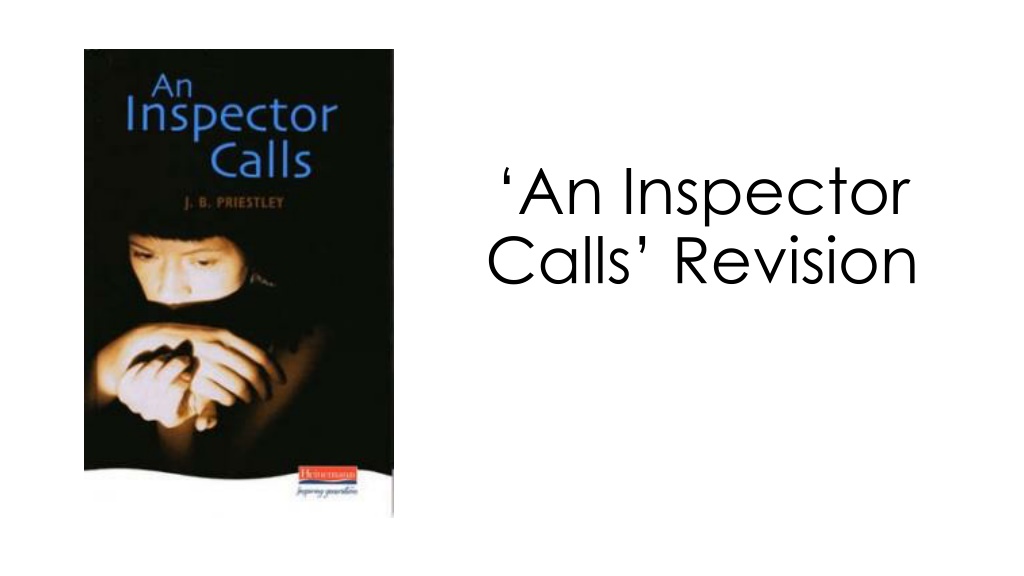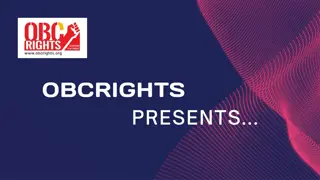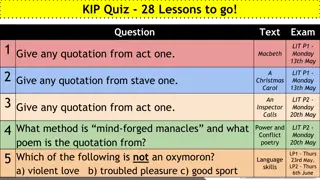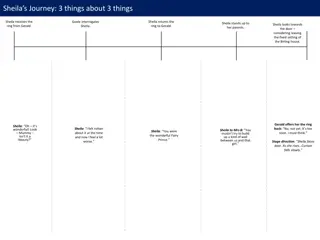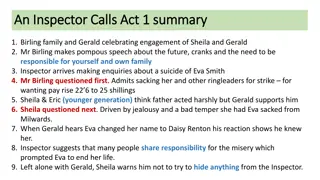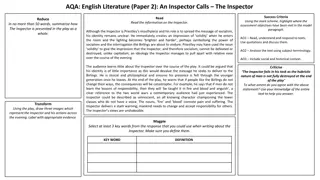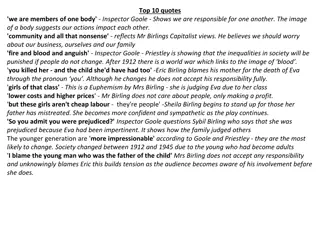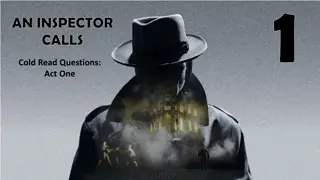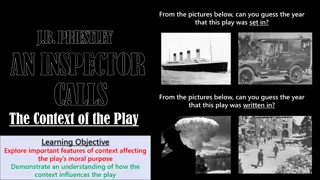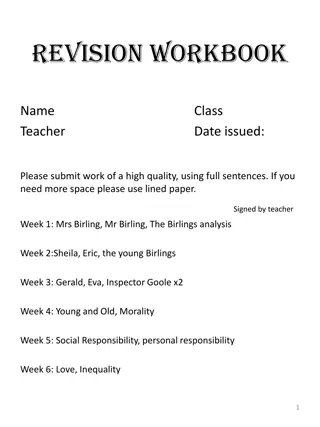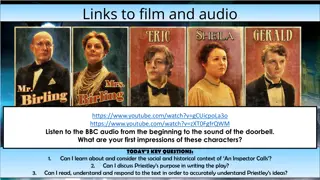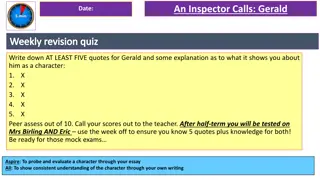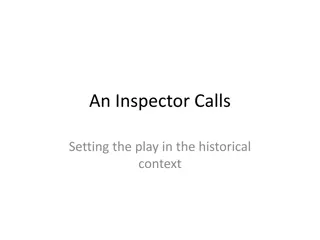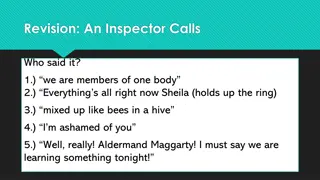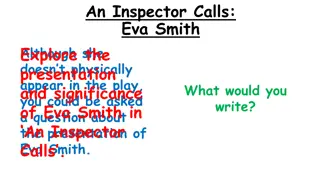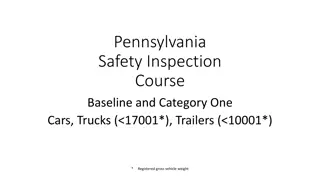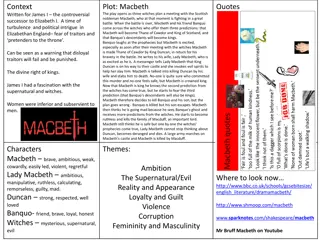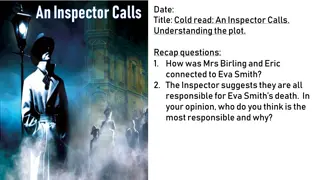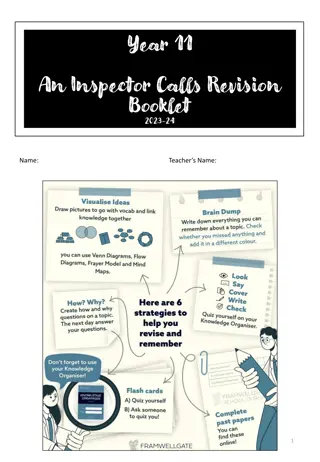An Inspector Calls: Act 1 Exploration
In this scene from "An Inspector Calls," we are introduced to the Birling family and Gerald as they celebrate a special occasion. Priestley sets the stage with detailed character descriptions, showcasing the dynamics within the family. The presence of Edna, the parlourmaid, adds an interesting layer to the scene. Through Mr. Birling's speech and interactions, we see hints of capitalism and class distinctions. The extract also sheds light on Mr. Birling's values and ambitions, particularly concerning his daughter's engagement.
Download Presentation

Please find below an Image/Link to download the presentation.
The content on the website is provided AS IS for your information and personal use only. It may not be sold, licensed, or shared on other websites without obtaining consent from the author. Download presentation by click this link. If you encounter any issues during the download, it is possible that the publisher has removed the file from their server.
E N D
Presentation Transcript
An Inspector Calls Revision
1. Opening Stage Directions (At rise of curtain, the four Birlings and Gerald are seated at the table, with Arthur Birling at one end, his wife at the other, Eric downstage and Sheila and Gerald seated upstage. TASK #4 Complete single word analysis on the following words: TASK #1 What impression is Priestley trying to give us of the Birlings here? Why? -portentous -cold -shy -assertive which has no cloth, of the dessert plates and champagne glasses, etc, and then replacing them with decanter of port, cigar box and cigarettes. Port glasses are already on the table. All five are in evening dress of the period, the men in tails and white ties, not dinner-jackets. Arthur Birling is a heavy-looking, rather portentous man in this middle fifties with fairly easy manners but rather provincial in this speech. His wife is about fifty, a rather cold woman and her husband's social superior. Sheila is a pretty girl in her early twenties, very pleased with life and rather excited. Gerald Croft is an attractive chap about thirty, rather too manly to be a dandy but very much the well-bred young man-about-town. Eric is in his early twenties, not quite at ease, half shy, half assertive. At the moment they have all had a good dinner, are celebrating a special occasion, and are pleased with themselves.) Edna, the parlourmaid, is just clearing the table, TASK #5 Why is Edna present in this scene? How is she different from the others? TASK #2 Why is Mrs Birling, Mr Birling s social superior considering An Inspector Calls is set in a patriarchal society? TASK #6 What do the possessions of the Birling s tell you about them? TASK #3 Highlight any words that you do not understand. Write them in this box and look up their definition.
2. Lower costs and higher prices Mrs Birling: Now stop it, you two. Arthur, what about this famous toast of yours? TASK #4 What kind of character is Eric here? TASK #1 Why do you really think Sir George and Lady Croft are not at the party? Birling: Yes, of course. (clears his throat.) Well, Gerald, I know you agreed that we should only have this quiet little family party. It's a pity Sir George and er Lady Croft can't be with us, but they're abroad and so it can't be helped. As I told you, they sent me a very nice cable couldn't be nicer. I'm not sorry that we're celebrating quietly like this- Mrs Birling: Much nicer really. Gerald: I agree. TASK #5 How does this extract enforce Mr Birling as a capitalist? TASK #2 Highlight everywhere where Mr Birling mentions Sheila in his engagement speech. What do you notice? What does this tell you? Birling: So do I, but it makes speech-making more difficult- Eric: (not too rudely) Well, don't do any. We'll drink their health and have done with it. Birling: No, we won't. It's one of the happiest nights of my life. And one day, I hope, Eric, when you've a daughter of your own, you'll understand why. Gerald, I m going to tell you frankly, without any pretences, that your engagement to Sheila means a tremendous lot to me. She'll make you happy, and I m sure you'll make her happy. You're just the kind of son-in-law I always wanted. Your father and I have been friendly rivals in business for some time now though Crofts Limited are both older and bigger than Birling and company and now you've brought us together, and perhaps we may look forward to the time when Crofts and Birlings are no longer competing but are working together for lower costs and higher prices. TASK #6 You re just the son-in-law I always wanted Which of Gerald s qualities does Mr Birling like? TASK #3 Does Mr Birling actually care about Sheila s engagement? Discuss your ideas using quotations from the text. Gerald: Hear, hear! And I think my father would agree to that.
3. The Ring Sheila: (trying to be light and easy) You be careful or I ll start weeping. TASK #4 What kind of character is Eric here? TASK #1 Look mummy What does this quotation tell you about Sheila s character? Gerald: (smiling) Well, perhaps this will help to stop it. (He produces a ring case.) Sheila: (excited)Oh Gerald you ve got it is it the one you wanted me to have? Gerald: (giving the case to her) Yes the very one. Sheila: (taking out the ring) Oh it's wonderful! Look mummy isn't it a beauty? Oh darling - TASK #5 Consider the stage directions that have been highlighted. What do they tell you about the atmosphere of this scene? Why does Priestley want to set this atmosphere? (She kisses Gerald hastily.) TASK #2 What do you think the ring symbolises here? Eric: steady the buffs! Sheila: (who has put the ring on, admiringly) I think it's perfect. Now I really feel engaged. Mrs Birling: So you ought, darling. It's a lovely ring. Be careful with it. Sheila: Careful! I'll never let it go out of my sight for an instant. Mrs Birling: (smiling) Well, it came just at the right moment. That was clever of you, Gerald. Now, Arthur, if you've no more to say, I think Sheila and I had better go into the drawing room and leave you men- TASK #6 (He holds them for a moment before continuing) Why does Mr Birling do this? TASK #3 I ll never let it go out of my sight for an instant Considering what happens later in the play, what is the significance of this line? Birling: (rather heavily) I just want to say this. (noticing that Sheila is still admiring her ring.) Are you listening, Sheila? This concerns you too. And after all I don't often make speeches at you - Sheila: I m sorry, daddy. Actually I was listening. (She looks attentive, as they all do. He holds them for a moment before continuing.)
4. Birlings Speech #1 I just want to say this. There s a good deal of silly talk about these days but and I speak as a hard-headed business man, who has to take risks and knows what he s about I say, you can ignore all this silly pessimistic talk. When you marry, you ll be marrying at a very good time. Yes, a very good time and soon it ll be an even better time. Last month, just because the miners came out on strike, there s a lot of wild talk about possible labour trouble in the near future. Don t worry. We ve passed the worst of it. We employers at last are coming together to see that our interests and the interests of Capital are properly protected. And we re in for a time of steadily increasing prosperity. TASK #4 - Why is Birling wrong here? TASK #1 Highlight everything in Birling s speech that he gets wrong. We re in for a time of steadily increasing prosperity. How is DRAMATIC IRONY being used here? Just because the Kaiser makes a speech or two, or a few German officers have too much to drink and begin talking nonsense, you'll hear some people say that war's inevitable. And to that I say - fiddlesticks! The Germans don't want war. Nobody wants war, except some half-civilized folks in the Balkans. And why? There's too much at stake these days. Everything to lose and nothing to gain by war. TASK #5 Why is Birling wrong when he speaks to Eric and Gerald? TASK #2 What is Priestley hoping to achieve by making Birling unlikeable? When you marry, you ll be marrying at a very good time. I say there isn't a chance of war. The world's developing so fast that it'll make war impossible. Look at the progress we're making. In a year or two we'll have aeroplanes that will be able to go anywhere. And look at the way the auto- mobile's making headway - bigger and faster all the time. And then ships. Why, a friend of mine went over this new liner last week - the Titanic - she sails next week - forty-six thousand eight hundred tons - New York in five days - and every luxury - and unsinkable, absolutely unsinkable. That's what you've got to keep your eye on, facts like that, progress like that - and not a few German officers talking nonsense and a few scaremongers here making a fuss about nothing. TASK #6 Birling presents his opinion as fact. Why does he do this? What does this tell you about his character? TASK #3 Eric tries to speak to his father in this speech but Birling keeps cutting him off. Why do you think Birling treats Eric in this way? Now you three young people, just listen to this - and remember what I'm telling you now. In twenty or thirty years time - let's say, in 1940 - you may be giving a little party like this - your son or daughter might be getting engaged - and I tell you, by that time you'll be living in a world that'll have forgotten all these Capital versus Labour agitations and all these silly little war scares. There'll be peace and prosperity and rapid progress everywhere - except of course in Russia, which will always be behindhand naturally.
5. Birlings Speech #2 TASK #4 - Why does Birling emphasise the fact that Gerald and Eric are young ? TASK #1 Highlight all of the personal pronouns. Does the fact they are all masculine tell you anything about Birling or the time the play is set? I don t want to lecture you two young fellows again. But what so many of you don t seem to understand now, when things are so much easier, is that a man has to make his own way has to look after himself and his family too and so long as he does that, he won t come to much harm. But the way some of these cranks talk and write now, you d think everybody has to look after everybody else, as if we were all mixed up together like bees in a hive community and all that nonsense. But take my word for it, you youngsters and I ve learnt in the good hard school of experience that a man has to mind his own business and look after himself and his own and TASK #5 How does Birling disregard the socialist ideology in this extract? Try and use a quotation in your answer. TASK #2 Look at the word again in the first line. What does it imply about Birling? We hear the sharp ring of a front door bell. BIRLING stops to listen. TASK #6 Why does the doorbell ring when it does? TASK #3 Who is Birling referring to when he says, the way some of these cranks talk ?
6. The Inspector Edna: (opening door, and announcing) Inspector Goole. TASK #4 How do you think Priestley wants the audience to react to the Inspector when they first see him enter? TASK #1 Complete single word analysis on the words highlighted in the stage directions. What can you infer about the Inspector based on them? (The Inspector enters, and Edna goes, closingdoor after her. The Inspector need not be a big man but he creates at once an impression of massiveness, solidity and purposefulness. He is a man in his fifties, dressed in a plain darkish suit of the period. He speaks carefully, weightily, and has a disconcerting habit of looking hard at the person he addresses before actually speaking.) Inspector: Mr Birling? Birling: Yes. Sit down inspector. TASK #5 The Inspector s lines are short and blunt compared to how Mr Birling speaks. Why? TASK #2 He speaks carefully, weightily What do these adverbs suggest about the Inspector? Inspector: (sitting) Thank you, sir. Birling: Have a glass of port or a little whisky? Inspector: No, thank you, Mr Birling. I'm on duty. Birling: You're new, aren't you? Inspector: Yes, sir. Only recently transferred. Birling: I thought you must be. I was an alderman for years and lord mayor two years ago and I m still on the bench so I know the Brumley police offices pretty well and I thought I d never seen you before. TASK #6 Why does Mr Birling mention his societal positions to the Inspector? TASK #3 Why do you think the Inspector looks hard at the person he addresses before speaking? Inspector: Quite so.
7. Sheila and Milwards Sheila: (distressed) I went to the manager at Milwards and I told him that if they didn't get rid of that girl, I d never go near the place again and I d persuade mother to close our account with them. TASK #4 Highlight everywhere in the extract where Sheila begins to accept responsibility. TASK #1 How does the Inspector demonstrate that he is in control here? Inspector: And why did you do that? Sheila: Because I was in a furious temper. Inspector: And what had this girl done to make you lose your temper? Sheila: When I was looking at myself in the mirror I caught sight of her smiling at the assistant, and I was furious with her. I'd been in a bad temper anyhow. Inspector: And was it the girl s fault? Sheila: No, not really. It was my own fault. (suddenly, to Gerald) All right, Gerald, you needn't look at me like that. At least, I'm trying to tell the truth. I expect you've done things you're ashamed of too. TASK #5 Sheila agrees with what the Inspector tells her and begins to accept that what she has done is wrong. What does this tell you about her? TASK #2 How does Priestley create sympathy for Eva Smith through Sheila s description of her? Gerald: (surprised) Well, I never said I hadn't. I don't see why Inspector: (cutting in) Never mind about that. You can settle that between you afterwards. (to Sheila.) What happened? Sheila: I'd gone in to try something on. It was an idea of my own mother had been against it, and so had the assistant but I insisted. As soon as I tried it on, I knew they'd been right. It just didn't suit me at all. I looked silly in the thing. Well, this girl had brought the dress up from the workroom, and when the assistant Miss Francis had asked her something about it, this girl, to show us what she meant, had held the dress up, as if she was wearing it. And it just suited her. She was the right type for it, just as I was the wrong type. She was very pretty too with big dark eyes and that didn't make it any better. Well, when I tried the thing on and looked at myself and knew that it was all wrong, I caught sight of this girl smiling at Miss Francis as if to say: 'doesn't she look awful' and I was absolutely furious. I was very rude to both of them, and then I went to the manager and told him that this girl had been very impertinent and and (she almost breaks down, but just controls herself.) How could I know what would happen afterwards? If she'd been some miserable plain little creature, I don't suppose I d have done it. But she was very pretty and looked as if she could take care of herself. I couldn't be sorry for her. TASK #6 How have the rich and powerful exploited the poor and weak in this scene? TASK #3 How is Priestley beginning to portray the younger generation in a positive light? Inspector: In fact, in a kind of way, you might be said to have been jealous of her. Sheila: Yes, I suppose so. Inspector: And so you used the power you had, as a daughter of a good customer and also of a man well known in the town, to punish the girl just because she made you feel like that?
8. Sheila questions Gerald Sheila: He went into the drawing room, to tell mother what was happening here. Eric, take the inspector along to the drawing-room. TASK #3 Highlight words that Sheila calls Gerald and analyse them. What do they imply about the way she is feeling at this point in the play? TASK #1 Summarise what is happening in this scene. (As Eric moves, the inspector looks from Sheila to Gerald, thengoes out with Eric.) Well, Gerald? Gerald: (trying to smile) Well what, Sheila? Sheila: How did you come to know this girl Eva Smith? Gerald: I didn't. Sheila: Daisy Renton then it's the same thing. Gerald: Why should I have to know her? Sheila: Oh don't be stupid. We haven't much time. You gave yourself away as soon as he mentioned her other name. TASK #4 How is the Inspector s presence felt in this scene even though he does not appear? TASK #2 How is Gerald presented in this scene? Use quotations to help you back up your ideas and make sure you hit all assessment objectives. Gerald: All right. I knew her. Let's leave it at that. Sheila: We can't leave it at that. Gerald: (approaching her) Now listen, darling-- Sheila: No, that's no use. You not only knew her but you knew her very well. Otherwise, you wouldn't look so guilty about it. When did you first get to know her? (He does not reply) Was it after she left Milwards? When she changed her name, as he said, and began to lead a different sort of life? Were you seeing her last spring and summer, during that time you hardly came near me and said you were so busy? Were you? (He does not reply but looks at her.) TASK #5 How has Sheila developed from the beginning of the play? Yes, of course you were. Gerald: I'm sorry, Sheila. But it was all over and done with, last summer. I hadn't set eyes on the girl for at least six months. I don't come into this suicide business. Sheila: I thought I didn't half an hour ago. Gerald: You don't. Neither of us does. So for god's sake don't say anything to the inspector. Sheila: About you and this girl? Gerald: Yes. We can keep it from him. Sheila: (laughs rather hysterically) Why you fool he knows. Of course he knows. And I hate to think how much he knows that we don't know yet. You'll see. You'll see.
1. Gerald and Sheila Gerald: You've been through it and now you want to see somebody else put through it. TASK #3 Highlight all the lines that imply Sheila is beginning to take responsibility. Explain your choices. TASK #1 Sheila and Gerald s relationship begins to crumble quickly. Why do you think Priestley destroys their relationship so quickly? Sheila: (bitterly) So that's what you think I'm like. I'm glad I realized it in time, Gerald. Gerald: No, no, I didn't mean - Sheila: (cutting in) Yes, you did. And if you'd really loved me, you couldn't have said that. You listened to that nice story about me. I got that girl sacked from Milwards. And now you've made up your mind I must obviously be a selfish, vindictive creature. Gerald: I neither said that nor even suggested it. Sheila: Then why say I want to see somebody else put through it? That's not what I mean at all. Gerald: All right then, I'm sorry. Sheila: Yes, but you don't believe me. And this is just the wrong time not to believe me. Inspector: (massively taking charge) Allow me, Miss Birling. (to Gerald.) I can tell you why Miss Birling wants to stay on and why she says it might be better for her if she did. A girl died tonight. A pretty, lively sort of girl, who never did anybody any harm. But she died in misery and agony hating life Sheila: (Distressed) Don't please I know, I know and I can't stop thinking about it Inspector: (Ignoring this) Now Miss Birling has just been made to understand what she did to this girl. She feels responsible. And if she leaves us now, and doesn't hear any more, then she'll feel she's entirely to blame, she'll be alone with her responsibility, the rest of tonight, all tomorrow, all the next night-- Sheila: (eagerly) Yes, that's it. And I know I'm to blame and I'm desperately sorry but I can't believe I won't believe it's simply my fault that in that in the end she she committed suicide. That would be too horrible Inspector: (sternly to them both) You see, we have to share something. If there's nothing else, we'll have to share our guilt. TASK #4 How is the Inspector presented in this scene? TASK #5 There s no reason why you should Is it important that we understand who the Inspector is or not? Explain. TASK #2 What atmosphere is Priestley trying to convey here? Why? How does he do it? Sheila: (staring at him) Yes. That's true. You know. (She goes close to him, wonderingly.) I don't understand about you. Inspector: (calmly) There's no reason why you should. // he regards her calmly while she stares at him wonderingly and dubiously. Now Mrs Birling. Enters, briskly and self-confidently, quite out of key with the little scene that has just passed. Sheila feels this at once.//
2. Mrs Birling and the Inspector Mrs Birling: (rebuking them) I'm talking to the inspector now, if you don't mind. (to inspector, rather grandly.) I realize that you may have to conduct some sort of inquiry, but I must say that so far you seem to be conducting in a rather peculiar and offensive manner. You know of course that my husband was lord mayor only two years ago and that he's still a magistrate-- Gerald: (cutting, rather impatiently) Mrs Birling, the inspector knows all that. And I don't think it's a very good idea to remind him-- Sheila: (cutting in) It's crazy. Stop it, please, mother. Inspector: (imperturbable) Yes. Now what about Mr Birling? Mrs Birling: He's coming back in a moment. He's just talking to my son, Eric, who seems to be in an excitable silly mood. Inspector: What's the matter with him? Mrs Birling: Eric? Oh I'm afraid he may have had rather too much to drink tonight. We were having a little celebration here-- Inspector: (cutting in) isn't he used to drinking? Mrs Birling: No, of course not. He's only a boy. Inspector: No, he's a young man. And some young men drink far too much. Sheila: And Eric's one of them. Mrs Birling: (very sharply) Sheila! TASK #3 Mrs Birling is not a typical maternal figure. Highlight evidence in the text that helps you prove this statement correct and explain your choices. TASK #1 How is Mrs Birling presented through Priestley s use of stage directions? Explain your ideas. TASK #4 We really must stop these silly pretences What does Sheila mean here? If they stop these pretences , what would the impact be on the Birling family? Sheila: (urgently) I don't want to get poor Eric into trouble. He's probably in enough trouble already. But we really must stop these silly pretences. This isn't the time to pretend that Eric isn't used to drink. He's been steadily drinking too much for the last two years. Mrs Birling: (staggered) it isn't true. You know him, Gerald -and you're a man you must know it isn't true. Inspector: (as Gerald hesitates) Well, Mr Croft? Gerald: (apologetically, to Mrs Birling) I'm afraid it is, y'know. Actually I've never seen much of him outside this house but- well, I have gathered that he does drink pretty hard. Mrs Birling: (bitterly) And this is the time you choose to tell me. TASK #2 What was the role of upper class women in the early 1900s? Does Mrs Birling reflect this stereotype?
3. Gerald and the Inspector Gerald: Yes. I asked her questions about herself. She told me her name was Daisy Renton, that she'd lost both parents, that she came originally from somewhere outside Brumley. She also told me she'd had a job in one of the works here and had had to leave after a strike. She said something about the shop too, but wouldn't say which it was, and she was deliberately vague about what happened. I couldn't get any exact details from her about herself just because she felt I was interested and friendly but at the same time she wanted to be Daisy Renton and not Eva Smith. In fact, I heard that name for the first time tonight. What she did let slip though she didn't mean to was that she was desperately hard up and at that moment was actually hungry. I made the people at the county find some food for her. Inspector: And then you decided to keep her as your mistress? Mrs Birling: What? Sheila: Of course, mother. It was obvious from the start. Go on, Gerald. Don't mind mother. Gerald: (steadily) I discovered, not that night but two nights later, when we met again not accidentally this time of course - that in fact she hadn't a penny and was going to be turned out of the miserable back room she had. It happened that a friend of mine, Charlie Brunswick, had gone off to Canada for six months and had let me have the key of a nice little set of rooms he had in Morgan Terrace and had asked me to keep an eye on them for him and use them if I wanted to. So I insisted on Daisy moving into those rooms and I made her take some money to keep her going there. (carefully, to the inspector.) I want you to understand that I didn't install her there so that I could make love to her. I made her go to Morgan Terrace because I was sorry for her, and didn't like the idea of her going back to the palace bar. I didn't ask for anything in return. Inspector: I see. Sheila: Yes, but why are you saying that to him? You ought to be saying it to me. Gerald: I suppose I ought really. I'm sorry, Sheila. Somehow I-- Sheila: (cutting in, as he hesitates) I know. Somehow he makes you. TASK #3 Gerald and Eva bond on an emotional level. Do you think Gerald s abandonment of Eva is the worst thing she has experienced so far or not? Explain. TASK #1 What is Sheila s purpose in this scene? Explain your ideas. TASK #2 Why do you think Gerald talks to the Inspector steadily and carefully ? TASK #4 What is your own opinion of Gerald s story? Do you think he truly loved Eva/Daisy or do you think this is another example of the rich exploiting the poor?
4. Sheila hands back the ring Gerald: In that case as I'm rather more upset by this business than I probably appear to be and well, I'd like to be alone for a while I'd be glad if you'd let me go. Inspector: Go where? Home? Gerald: No. I'll just go out walk about for a while, if you don't mind. I'll come back. Inspector: All right, Mr Croft. Sheila: But just in case you forget or decide not to come back, Gerald, I think you'd better take this with you. (She hands him the ring.) Gerald: I see. Well, I was expecting this. Sheila: I don't dislike you as I did half an hour ago, Gerald. In fact, in some odd way, I rather respect you more than I've ever done before. I knew anyhow you were lying about those months last year when you hardly came near me. I knew there was something fishy about that time. And now at least you've been honest. And I believe what you told us about the way you helped her at first. Just out of pity. And it was my fault really that she was so desperate when you first met her. But this has made a difference. You and I aren't the same people who sat down to dinner here. We'd have to start all over again, getting to know each other- - Birling: Now, Sheila, I'm not defending him. But you must understand that a lot of young men- Sheila: Don't interfere, please, father. Gerald knows what I mean, and you apparently don't. Gerald: Yes, I know what you mean. But I'm coming back if I may. TASK #3 Why would Birling attempt to defend Gerald? TASK #1 What do you think the ring represents/symbolises in this scene? TASK #4 How is Sheila challenging conventions here? What would be expected of her at this time and what is she doing instead? TASK #2 Consider what Sheila said about the ring at the beginning of the play. Why is it so significant that she hands the ring back herself? What does this suggest about her character and the events that have forced her to hand it over? TASK #5 Don t interfere, please, father What is happening to the older and younger generation?
5. Mrs Birlings Story Mrs Birling: Yes, I think it was simply a piece of gross impertinence quite deliberate and naturally that was one of the things that prejudiced me against her case. Birling: And I should think so! Damned impudence! Inspector: You admit being prejudiced against her case? Mrs Birling: Yes. Sheila: Mother, she's just died a horrible death don't forget. Mrs Birling: I'm very sorry. But I think she had only herself to blame. Inspector: Was it owing to your influence, as the most prominent member of the committee that help was refused the girl? Mrs Birling: Possibly. Inspector: Was it or was it not your influence? Mrs Birling: (stung) Yes, it was. I didn't like her manner. She'd impertinently made use of our name, though she pretended afterwards it just happened to be the first she thought of. She had to admit, after I began questioning her, that she had no claim to the name, that she wasn't married, and that the story she told at first about a husband who'd deserted her was quite false. It didn't take me long to get the truth or some of the truth out of her. Inspector: Why did she want help? Mrs Birling: You know very well why she wanted help. Inspector: No, I don't. I know why she needed help. But as I wasn't there, I don't know what she asked from your committee. Mrs Birling: I don't think we need discuss it. TASK #4 How is Mrs Birling presented as hubristic in this scene? Use quotations from the text and hit all of the assessment objectives. TASK #1 I think she had only herself to blame What does this tell you about Mrs Birling s character? TASK #2 How does Mrs Birling attempt to gain control of the situation here? TASK #5 Despite her flaws, Mrs Birling should be commended for trying to protect her family. Discuss. TASK #3 I did nothing I m ashamed of How is Priestley using Mrs Birling to help promote socialism to his audiences? Inspector: You have no hope of not discussing it, Mrs Birling. Mrs Birling: If you think you can bring any pressure to bear upon me, Inspector, you're quite mistaken. Unlike the other three, I did nothing I'm ashamed of or that won't bear investigation. The girl asked for assistance. We were asked to look carefully into the claims made upon us. I wasn't satisfied with the girl's claim she seemed to me not a good case and so I used my influence to have it refused. And in spite of what's happened to the girl since, I consider I did my duty. So if I prefer not to discuss it any further, you have no power to make me change my mind. Inspector: Yes I have. Mrs Birling: No you haven't. Simply because I've done nothing wrong and you know it.
6. Mrs Birling 2 TASK #4 Consider Priestley s use of punctuation. Discuss what the punctuation reveals about how the characters are feeling. TASK #1 Find and highlight a quotation that shows a difference in Mrs Birling s character to what we have seen before. Explain your choice. (Sheila begins crying quietly. Mrs Birling turns to the Inspector.) Mrs Birling: And if you'd take some steps to find this young man and then make sure that he's compelled to confess in public his responsibility instead of staying here asking quite unnecessary questions then you really would be doing your duty. Inspector: (grimly) Don't worry, Mrs Birling. I shall do my duty. (He looks at his watch.) Mrs Birling: (triumphantly) I'm glad to hear it. Inspector: No hushing up, eh? Make an example of the young man, eh? Public confession of responsibility um? Mrs Birling: Certainly. I consider it your duty. And now no doubt you'd like to say good night. Inspector: Not yet. I'm waiting. Mrs Birling: Waiting for what? Inspector: To do my duty. Sheila: (distressed) Now, mother don't you see? Mrs Birling: (understanding now) But surely . I mean it's ridiculous . . . (She stops, and exchanges a frightened glance with her husband.) Birling: (terrified now) Look Inspector, you're not trying to tell us that that my boy is mixed up in this - ? Inspector: (sternly) If he is, then we know what to do, don't we? Mrs Birling has just told us. Birling: (thunderstruck) My God! But look here - Mrs Birling: (agitated) I don't believe it. I won't believe it . . . Sheila: Mother I begged you and begged you to stop- (Inspector holds up a hand. We hear the front door. They wait, looking towards door. Eric enters, looking extremely pale and distressed. He meets their inquiring stares. Curtain TASK #5 How is the Inspector presented as a powerful figure in full control of the situation? TASK #2 Mrs Birling triumphantly says I m glad to hear it. What does this adverb imply about how she is feeling? Try and come up with TWO ideas. TASK #6 At this point in the play, do you think there is any hope of redemption for the Birlings? Explain. TASK #3 Why has the Inspector interrogated Mrs Birling and Eric out of sequence? Consider what the structure of events does to the drama.
1. Eric s Confession Birling: You must give me a list of those accounts. I've got to cover this up as soon as I can. You damned fool why didn't you come to me when you found yourself in this mess? TASK #4 Look at the Inspector s stage directions. Analyse them. What do they imply about his character? TASK #1 Summarise what is happening in this scene. Eric: Because you're not the kind of father a chap could go to when he's in trouble that's why. Birling: (angrily) Don't talk to me like that. Your trouble is you've been spoilt-- Inspector: (cutting in) And my trouble is that I haven't much time. You'll be able to divide the responsibility between you when I've gone. (To Eric.) Just one last question, that's all. The girl discovered that this money you were giving her was stolen, didn't she? Eric: (miserably) Yes. That was the worst of all. She wouldn't take any more, and she didn't want to see me again. (sudden startled tone) Here, but how did you know that? Did she tell you? Inspector: No. She told me nothing. I never spoke to her. TASK #5 What do the dashes in Eric s speech suggest about the way he is feeling? TASK #2 How does this scene present Mr Birling as a weak character? Sheila: She told mother. Mrs Birling: (alarmed) Sheila! Sheila: Well, he has to know. Eric: (to Mrs Birling) She told you? Did she come here but then she couldn't have done, she didn't even know I lived here. What happened? (Mrs Birling, distressed, shakes her head but does not reply.) Come on, don't just look like that. Tell me tell me what happened? Inspector: (with calm authority) I'll tell you. She went to your mother's committee for help, after she'd done with you. Your mother refused that help. TASK #6 The older and younger generation are complete strangers by the end of the play. It is impossible for them to fix the rift that has occurred between them. Discuss. TASK #3 How do you think Priestley intends an audience to react here? Why? Eric: (nearly at breaking point) Then you killed her. She came to you to protect me and you turned her away yes, and you killed her and the child she'd have had too my child your own grandchild you killed them both damn you, damn you- Mrs Birling: (very distressed now) No Eric please I didn't know I didn't understand- Eric: (almost threatening her) You don't understand anything. You never did. You never even tried you - Sheila: (frightened) Eric, don't don't- Birling: (furious, intervening) Why, you hysterical young fool get back or I'll- Inspector: (taking charge, masterfully) Stop.
2. Inspectors Final Speech TASK #4 - Why does Priestley use the Inspector to deliver this speech? TASK #1 What is Priestley s view about the importance of society? But just remember this. One Eva Smith has gone- but there are millions and millions and millions of Eva Smiths and John Smiths still left with us, with their lives, their hopes and fears, their suffering and chance of happiness, all intertwined with our lives, with what we think and say and do. We don t live alone. We are members of one body. We are responsible for each other. And I tell you that the time will soon come when, if men will not learn that lesson, they will be taught it in fire and blood and anguish. Good night. TASK #5 Why does Priestley use such common names? TASK #2 When addressed to an audience in 1946, what is Priestley s message to the audience at the end of the speech? TASK #6 What is the most important word or phrase in this speech? Why is this so? TASK #3 Identify a language technique used, and explain its effect.
3. Older Generation vs Younger Generation Birling: (angrily) Yes, and you don't realize yet all you've done. Most of this is bound to come out. There'll be a public scandal. TASK #4 How does Priestley intend an audience to perceive the younger generation and the older generation? TASK #1 Look at the stage directions for how the characters are speaking. Complete single analysis on THREE adverbs. Eric: Well, I don't care now. Birling: You! You don't seem to care about anything. But I care. I was almost certain for a knighthood in the next Honours List- (Eric laughs rather hysterically, pointing at him.) Eric: (laughing) Oh for God's sake! What does it matter now whether they give you a knighthood or not? Birling: (sternly) It doesn't matter to you. Apparently nothing matters to you. But it may interest you to know that until every penny of that money you stole is repaid, you'll work for nothing. And there's going to be no more of this drinking round the town and picking up women in the palace bar- TASK #5 What are the differences between Mr Birling and Eric? Why do you think the differences between these two men are so important? TASK #2 What are the differences between the stage directions for the older and younger generation? Mrs Birling: (coming to life) I should think not. Eric, I'm absolutely ashamed of you. Eric: Well, I don't blame you. But don't forget I'm ashamed of you as well yes both of you. Birling: (angrily) Drop that. There's every excuse for what both your mother and I did it turned out unfortunately, that's all-- Sheila: (scornfully) That's all. Birling: Well, what have you to say? TASK #6 The younger generation are a way for Priestley to present what the future might look like. What is this future? TASK #3 What do you think the pace of this scene would be like and why? Sheila: I don't know where to begin. Birling: Then don't begin. Nobody wants you to. Sheila: I behaved badly too. I know I did I'm ashamed of it. But now you're beginning all over again to pretend that nothing much has happened- Birling: Nothing much has happened! Haven't I already said there'll be a public scandal unless we're lucky and who here will suffer from that more than I will? Sheila: But that's not what I'm talking about. I don't care about that. The point is, you don't seem to have learnt anything.
4. The Final Call Sheila: (passionately) You're pretending everything's just as it was before. TASK #4 Highlight evidence that implies the hubristic nature of man has not been fully destroyed and explain WHY you have highlighted it. TASK #1 How have the characters changed throughout the play? Eric: I'm not! Sheila: No, but these others are. Birling: Well, isn't it? We've been had, that's all. Sheila: So nothing really happened. So there's nothing to be sorry for, nothing to learn. We can all go on behaving just as we did. Mrs Birling: Well, why shouldn't we? Sheila: I tell you whoever that Inspector was, it was anything but a joke. You knew it then. You began to learn something. And now you've stopped. You're ready to go on in the same old way. TASK #5 What do the dashes in Birling s final speech imply about him? TASK #2 How has Sheila become a metaphorical inspector in this final scene? Birling: (amused) And you're not, eh? Sheila: No, because I remember what he said, how he looked, and what he made me feel. Fire and blood and anguish. And it frightens me the way you talk, and I can't listen to any more of it. Eric: And I agree with Sheila. It frightens me too. Birling: Well, go to bed then, and don't stand there being hysterical. Mrs Birling: They're over-tired. In the morning they'll be as amused as we are. Gerald: Everything's all right now, Sheila. (Holds up the ring.) What about this ring? Sheila: No, not yet. It's too soon. I must think. Birling: (pointing to Eric and Sheila) Now look at the pair of them the famous younger generation who know it all. And they can't even take a joke- TASK #6 Is the end meant to be explainable? What is Priestley s purpose at the end of the play? What do you think is happening? TASK #3 How is the divide between the older and younger generations presented here? (The telephone rings sharply. There is a moment's complete silence. Birling goes to answer it.) Yes?. . . .Mr Birling speaking. . . .What? - here- (But obviously the other person has rung off. He puts the telephone down slowly and looks in a panic stricken fashion at the others.) Birling: That was the police. A girl has just died on her way to the Infirmary after swallowing some disinfectant. And a police inspector is on his way here to ask some questions ----- (As they stare guiltily and dumbfounded, the curtain falls.)
